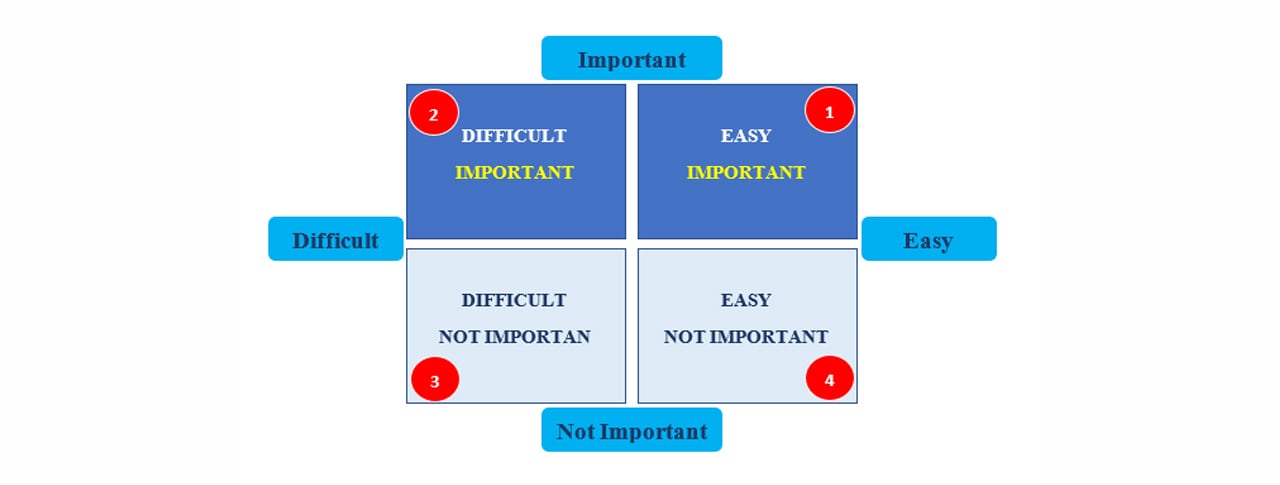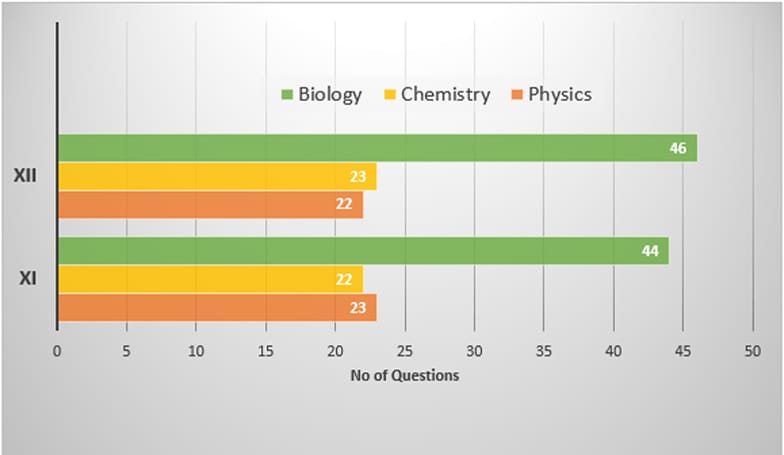Topics which are important for NEET 2020
by

NEET 2020 is hitting around the corner and less than 50 days left for the D day. You are not left with much time to go through with whole syllabus. So, how smartly can you prepare in this time to maximize your scores in upcoming NEET exam by putting less effort?
The first thing to know is that NTA does not allocate any weightage to any chapter and you should try to learn and understand all chapters of all subjects. So if you know clearly which chapter will be important and fetch you maximum marks in the exam, then it will be easier for you to take the right route in completing whole syllabus smartly.
Well our team of subject experts has analysed the pattern of the past years’ papers of NEET, to give you clear idea of syllabus by breaking chapters into 4 groups based on the efforts required to learn and score in the exam as well as the weightage of each chapter.

We will consider the chapter which fall in quadrant 1 and 2 in the above figure. These chapters cover most of the syllabus of NEET and can fetch you the maximum marks in the exam.
PHYSICS |
CHEMISTRY |
BIOLOGY |
Modern Physics |
Chemical bonding & molecular structure |
Biological classification |
Semiconductor devices |
Coordination Compounds |
Human Physiology & Plant Physiology |
Optics |
s, p, d & f block elements |
Principle of inheritance & variation |
Heat and Thermodynamics |
Equilibrium |
Environmental Issues |
Current electricity |
Chemical Kinetics |
Cell structure & Function |
Magnetics |
Atomic structure |
Human health & disease |
Electrostatics |
Aldehydes, Ketones and Carboxylic Acids |
Ecology & Environment |
System of particles & rotation mechanics |
Hydrocarbons
|
Genetics & Evolution |
| Human Health and Disease | ||
| Human reproduction | ||
| Biotechnology |
DETAILED ANALYSIS –
First, let’s have a look at the distribution of marks between Gr XI and Gr XII syllabus in the NEET exam.

NEET Chapter Wise Weightage and Important Chapters for NEET 2020 –
Based on the analysis of the previous years’ NEET question papers, this list is of all the important chapters for NEET and includes a chapter-wise weightage for every subject in NEET.
There would be a total of 45 questions in the Physics section of the NEET exam. The NEET Physics chapter-wise weightage expected in NEET 2020 exam (from Gr XI and Gr XII) is as follows:
Chapters |
Weightage (%) |
Average number of questions asked from the chapters |
Total Marks |
Grade XII |
|||
Modern Physics & Semiconductor |
15 % |
7 |
28 |
Optics |
9 % |
4 |
16 |
Electrostatics |
8 % |
3 |
12 |
EMI and AC |
4 % |
2 |
8 |
Current Electricity |
6 % |
3 |
12 |
Magnetics |
7 % |
3 |
12 |
|
49 % |
22 |
88 |
Grade XI |
|||
Heat and Thermodynamics |
9 % |
4 |
16 |
Waves and Oscillation |
6 % |
3 |
12 |
Laws of motion |
7 % |
2 |
8 |
Kinetic Theory of gases |
3 % |
2 |
8 |
System of Particles and Rotational Mechanics |
10 % |
4 |
16 |
Solids and Fluids |
4 % |
2 |
8 |
Work, Energy and Power |
4 % |
2 |
8 |
Gravitation |
3 % |
2 |
8 |
Kinematics |
3 % |
1 |
4 |
Units, Dimensions, Errors and Experiments |
2 % |
1 |
4 |
|
51 % |
23 |
92 |
Total |
100 % |
45 |
180 |
There would be a total of 45 questions in the Chemistry section of the NEET exam. The NEET Chemistry Chapter-wise weightage expected in NEET 2020 (from Physical, Organic and Inorganic Chemistry) is as follows:
Chapters |
Weightage (%) |
Average number of questions asked from the chapters |
Total Marks |
Physical Chemistry |
|||
Basic Concepts of Chemistry |
4 % |
2 |
8 |
Structure of Atom |
3 % |
1 |
4 |
Equilibrium |
4 % |
2 |
8 |
Redox Reactions |
2 % |
1 |
4 |
Thermodynamics |
3 % |
1 |
4 |
States of Matter |
3 % |
1 |
4 |
Surface Chemistry |
2 % |
1 |
4 |
Chemical Kinetics and Nuclear Chemistry |
3 % |
2 |
8 |
Electrochemistry |
2 % |
1 |
4 |
Solutions |
3 % |
2 |
8 |
Solid states |
3 % |
1 |
4 |
|
32 % |
15 |
60 |
Inorganic Chemistry |
|||
Chemical Bonding and Molecular Structure |
6 % |
2 |
8 |
Classification of Elements and Periodicity in Properties |
4 % |
2 |
8 |
Hydrogen |
2 % |
1 |
4 |
s-block |
3 % |
1 |
4 |
p-block |
5 % |
2 |
8 |
Coordination Compounds |
5 % |
2 |
8 |
d-block and f-block |
4 % |
1 |
4 |
Metallurgy |
2 % |
1 |
4 |
Practical Inorganic Chemistry |
2 % |
1 |
4 |
Environmental chemistry |
2 % |
1 |
4 |
|
35 % |
14 |
56 |
Organic Chemistry |
|||
General Organic Chemistry & Isomerism |
4 % |
2 |
8 |
Hydrocarbons |
6 % |
3 |
12 |
IUPAC Nomenclature of Organic Molecules |
3 % |
1 |
4 |
Practical Organic Chemistry |
2 % |
1 |
4 |
Haloalkanes and Haloarenes |
2 % |
1 |
4 |
Alcohols, Phenols and Ethers |
3 % |
2 |
8 |
Aldehydes, Ketones and Carboxylic Acids |
3 % |
2 |
8 |
Amines |
3 % |
2 |
8 |
Biomolecules, Polymers and Chemistry in Everyday Life |
7 % |
2 |
8 |
|
33 % |
16 |
64 |
Total |
100 % |
45 |
180 |
There would be a total of 90 questions in the Biology section of the NEET exam. The NEET Biology Chapter-wise weightage expected in NEET 2020 (from Gr XI and Gr XII) is as follows:
Chapters |
Weightage (%) |
Average number of questions asked from the chapters |
Total Marks |
Gr XI |
|||
The Living World |
2 % |
1 |
4 |
Biological classification |
2 % |
1 |
4 |
Plant Kingdom |
3 % |
2 |
8 |
Animal Kingdom |
3 % |
2 |
8 |
Morphology in flowering plants |
2 % |
1 |
4 |
Anatomy of Flowering Plant |
3 % |
3 |
12 |
Structural Organisation in Animals |
3 % |
2 |
8 |
Cell: The unit of life |
4 % |
5 |
20 |
Cell Cycle and Division |
3 % |
2 |
8 |
Biomolecules |
4 % |
4 |
16 |
Transportation in Plants |
2 % |
2 |
8 |
Mineral Nutrition |
1 % |
1 |
4 |
Photosynthesis in Higher Plants |
1 % |
1 |
4 |
Respiration in Plants |
1.5 % |
2 |
8 |
Plant Growth and Development |
1.5 % |
2 |
8 |
Breathing and exchange of gases |
2 % |
1 |
4 |
Digestion and Absorption |
2 % |
2 |
8 |
Body Fluids and Circulation |
1.5 % |
2 |
8 |
Excretory products and their elimination |
1.5 % |
2 |
8 |
Locomotion and Movement |
2 % |
2 |
8 |
Neural Control and Coordination |
1.5 % |
2 |
8 |
Chemical Coordination and Integration |
1.5 % |
2 |
8 |
|
48 % |
44 |
176 |
Gr XII |
|||
Reproduction in Organisms |
2 % |
1 |
4 |
Sexual Reproduction in flowering Plants |
5 % |
4 |
16 |
Human Reproduction |
3 % |
3 |
12 |
Reproductive Health |
3 % |
3 |
12 |
Principles of Inheritance and variation |
6 % |
7 |
28 |
Molecular basis of inheritance |
4 % |
3 |
12 |
Evolution |
4 % |
3 |
12 |
Human Health and Disease |
4 % |
4 |
16 |
Strategies for Enhancement in Food Production |
2 % |
1 |
4 |
Microbes in Human Welfare |
3 % |
3 |
12 |
Biotechnology: Principles and processes |
4 % |
3 |
12 |
Biotechnology and its application |
2 % |
2 |
8 |
Organisms and Population |
1 % |
1 |
4 |
Ecosystem |
2 % |
1 |
4 |
Biodiversity and Conservation |
3 % |
3 |
12 |
Environmental Issues |
4 % |
4 |
16 |
|
52 % |
46 |
184 |
Total |
100 % |
90 |
360 |
This is the right time to be prepared with the right strategy to ace the exam.
ALL THE BEST!

